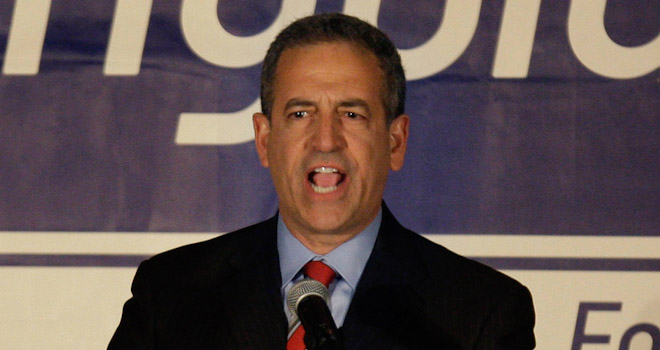Former Wisconsin Sen. Russ Feingold offered enthusiastic praise for President Obama’s deficit plan, and particularly for the so-called “Buffett rule” — a principle holding that people who make more than a million dollars a year should pay at least the same effective tax rate as middle class workers.
“I just want to say how pleased I am that the President is taking a strong stand with this Buffett rule,” Feingold said in a Wednesday interview. “What excites me even more, is it’s the only fiscally responsible approach.”
Feingold’s new advocacy group Progressives United will press the joint Super Committee to adopt the Buffett rule as part of a broader deficit reduction plan. In an email to supporters, Feingold will make it explicit. “[T]he influence of big corporations and the super rich is strong in Congress, and several senators — including Democratic ones — are already opposing this crucial effort,” the solicitation reads. “Tell the super committee how important it is to make millionaires pay their fair share.”
On Monday, Obama unveiled a budget framework to reduce deficits by about $3 trillion over the next 10 years. In it, he called for $1.5 trillion in new tax revenues drawn almost exclusively from wealthy Americans — by eliminating the Bush tax cuts benefiting people in the top two tax brackets, and by ending tax deductions for income over $250,000. This would represent a step toward a tax code that met the Buffett rule criterion.
“I’m in favor of completely repealing the upper income Bush tax cuts,” Feingold says.
If the two part ways, it’s over timing. President Obama — and most economists — want the higher taxes and spending cuts to begin in 2013, to give the fragile economy another 15 months to recover before consolidating the budget. Feingold says sooner would be better.
“I don’t necessarily share the view that waiting is necessary,” Feingold said. “We need the revenue. I’m pleased that the President has at least had the guts to get this on the table but we should try to make this happen as soon as possible.”
Feingold also praised most provisions of President Obama’s jobs bill, including the fact that it’s “properly paid for.”
The problem, of course, is that Republicans reject both plans, and continue to object to all new taxes. If Obama and Democrats can’t entice Republicans to compromise, Feingold said, their intransigence should become the basis of Obama’s campaign.
“If those on the right continue to insist that the wealthy don’t have to contribute at all, I think the President will have to take it to the people,” he said. “I would prefer that they compromise and that we get back on the right track..but i do think that if they’re going to take a hard line that we may have [to make this] the real central issue of the campaign.”










